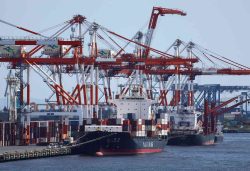21:50 JST, June 28, 2022
LONDON (Reuters) — Major global biodiversity loss could cause enough economic damage by the end of the decade to severely cut more than half of the world’s sovereign credit ratings — including China’s, the first major study on the issue has warned.
The research published on June 23 by a group of British universities looked at a range of scenarios, including one where a partial collapse of key ecosystems savaged nature-dependent industries such as farming and fishing that some economies rely on.
It estimated that the detrimental impact would result in 58% of the 26 countries studied facing at least a one-notch downgrade of their sovereign credit rating.
As ratings affect how much governments have to pay to borrow on the global capital markets, the downgrades would result in between $28 billion to $53 billion of additional interest costs annually.
“The ratings impact under the partial ecosystem services collapse scenario is in many cases significant and substantial,” the report said, adding that those additional debt costs would mean governments have even less to spend and that things like mortgage rates would go up.
The study carried out by the University of East Anglia, Cambridge, Sheffield Hallam University and SOAS University of London shows that China and Malaysia would be most severely hit, with rating downgrades by more than six notches in the partial collapse scenario.
India, Bangladesh, Indonesia and Ethiopia would face downgrades of approximately four notches, while almost a third of the countries analyzed would see more than three.
For China, that drop in creditworthiness would add an additional $12 billion to $18 billion to its yearly interest payment bill, while the country’s highly-indebted corporate sector would incur an additional $20 billion to $30 billion.
Malaysia’s costs would rise between $1 billion to $2.6 billion, while its companies would need to cover an additional $1 billion to $2.3 billion.
“More importantly, these two sovereigns would cross from investment to speculative-grade,” the report said, referring to what investors usually dub a higher risk “junk”-grade credit rating.
“Biodiversity loss can hit economies in multiple ways. A collapse in fisheries, for example, causes economic shockwaves along national supply chains and into other industries,” said coauthor Dr Patrycja Klusak, affiliated researcher at Cambridge’s Bennett Institute and Associate Professor at the University of East Anglia.
Top Articles in News Services
-

Prudential Life Expected to Face Inspection over Fraud
-

Hong Kong Ex-Publisher Jimmy Lai’s Sentence Raises International Outcry as China Defends It
-

Japan’s Nikkei Stock Average Touches 58,000 as Yen, Jgbs Rally on Election Fallout (UPDATE 1)
-

Trump Names Former Federal Reserve Governor Warsh as the Next Fed Chair, Replacing Powell
-

Suzuki Overtakes Nissan as Japan’s Third‑Largest Automaker in 2025
JN ACCESS RANKING
-

Japan Institute to Use Domestic Commercial Optical Lattice Clock to Set Japan Standard Time
-

Israeli Ambassador to Japan Speaks about Japan’s Role in the Reconstruction of Gaza
-

Man Infected with Measles May Have Come in Contact with Many People in Tokyo, Went to Store, Restaurant Around When Symptoms Emerged
-

Prudential Life Insurance Plans to Fully Compensate for Damages Caused by Fraudulent Actions Without Waiting for Third-Party Committee Review
-

Woman with Measles Visited Hospital in Tokyo Multiple Times Before Being Diagnosed with Disease

























